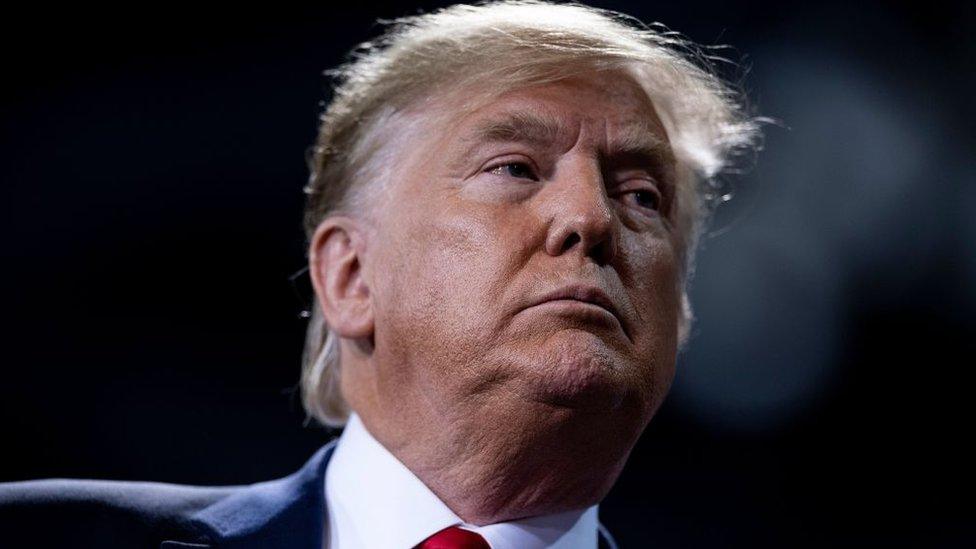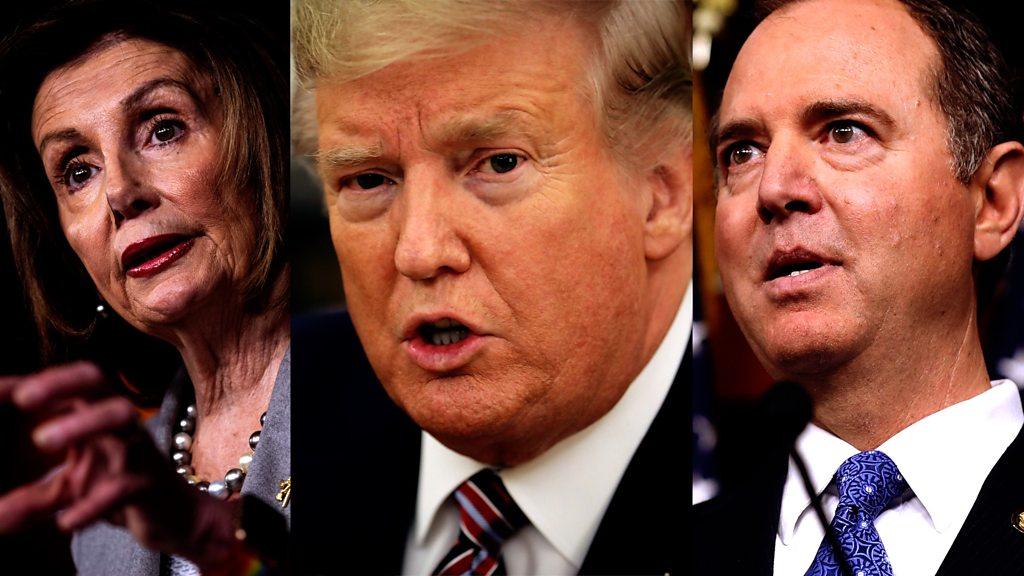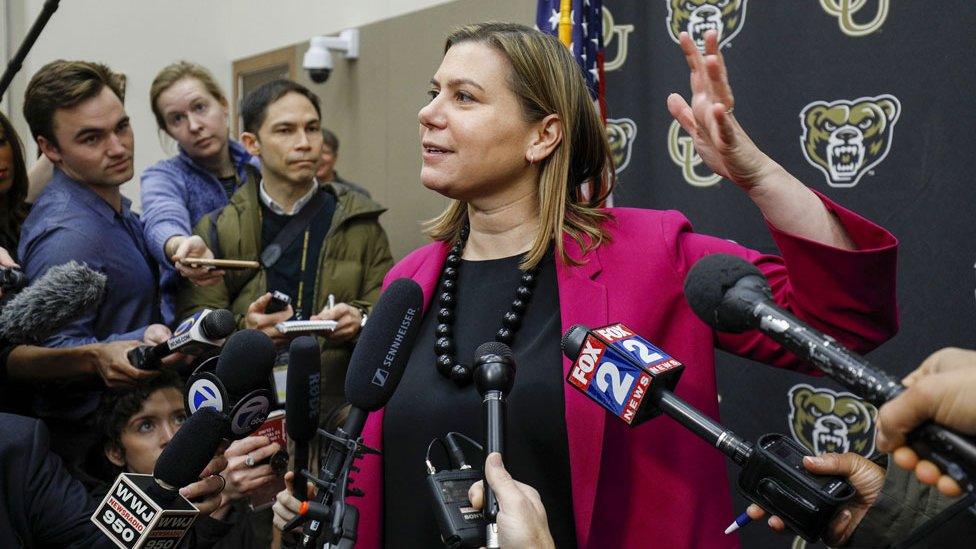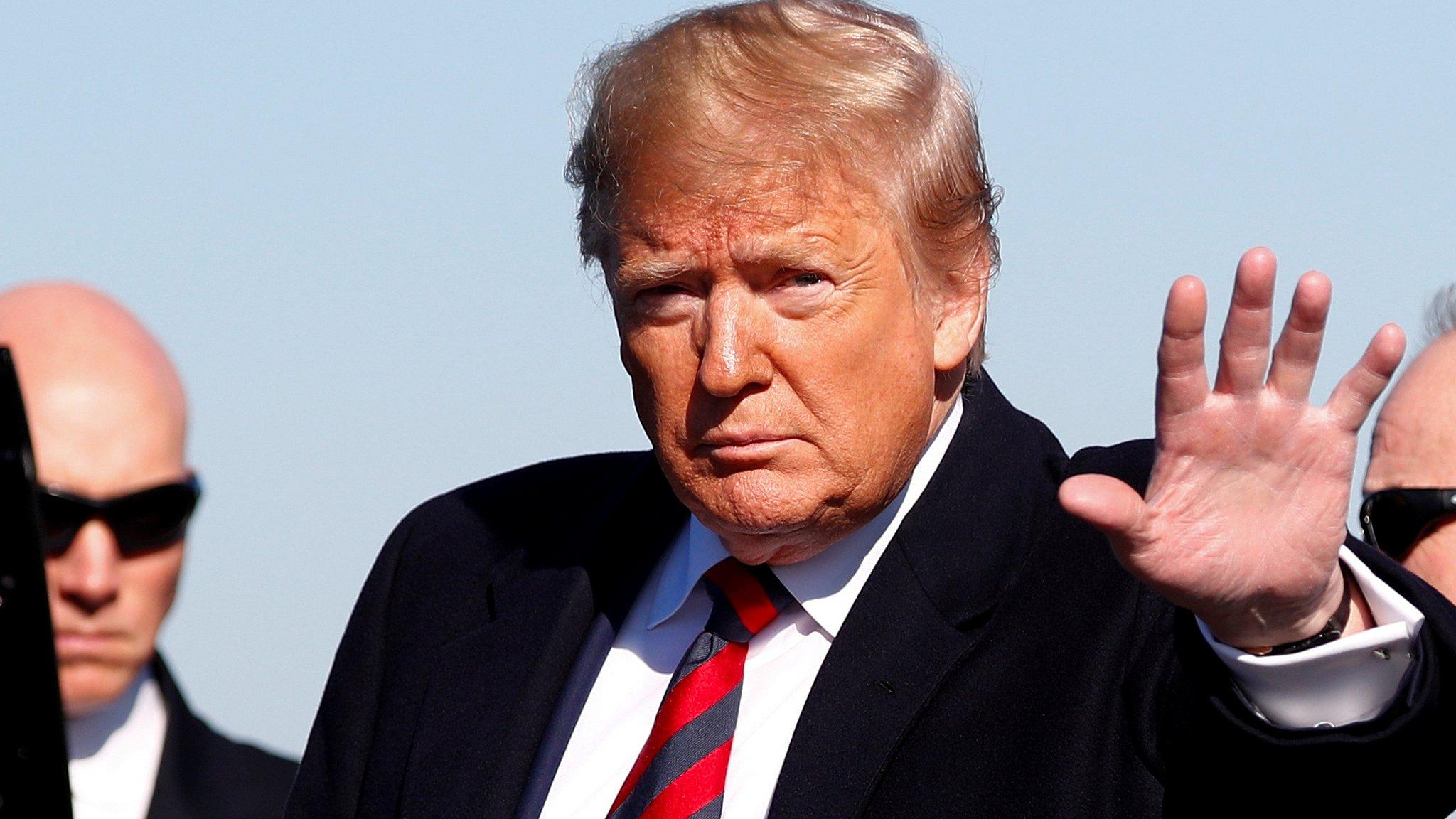Trump impeachment - your questions answered
- Published

Protesters in New York called for impeachment on the eve of the House vote
Donald Trump has become only the third US president to be impeached by the House of Representatives.
We answer your questions on the impeachment charges brought against the president.
When will the trial take place in the Senate? - Kamran Norell, Birmingham, UK
Nothing is set in stone yet, but the general consensus is the Senate will start its trial perhaps as early as the second week in January, when it returns from its winter recess.
That's what Chuck Schumer, the Democratic Senate minority leader, has requested.
And while Republican Senate leader Mitch McConnell may not like some of his counterpart's other requests for trial procedures, he may be OK with this timeline.
Will Trump have to testify in the Senate trial? - James Mooney, 34, Craigavon Northern Ireland
There is nothing requiring a president to testify in his or her own defence during a Senate trial. Neither Bill Clinton nor Andrew Johnson did so in their proceedings.
If there are witnesses allowed in Trump's Senate trial (no sure thing), the House impeachment managers - effectively, the prosecutors in this case - may try to call the president to testify. Such a decision would raise issues of presidential privilege and immunity, however, as well as an individual's constitutional right against self-incrimination in legal proceedings.
All of this is uncharted terrain, of course. If it comes up, it would land at the feet of Supreme Court Chief Justice John Roberts, who will preside over the president's Senate trial.
Another possibility is that Trump volunteers to testify in his own defence. He has expressed an openness to such a move in the past, but like many of his tweets and off-the-cuff statements, most observers suspect there was more bluster than substance to his suggestion. His political advisors would surely counsel against it.

What would the impact be on Trump's 2020 presidential bid if he was successfully impeached based on actions during his first term? - Grit Tokley, 29, London
That is the million-dollar question - and it's not clear what the answer is.
Republicans tout how impeachment has been a fundraising boon for Trump's presidential campaign, as his supporters rally around their embattled president.
Democrats counter that this vote will be a black mark on the president's name that voters will find impossible to ignore when casting their ballots.
Polls show a sharply divided nation whose opinions about the president, for and against, have not changed much because of the ongoing impeachment drama.
It is probably safe to say the 2020 election was going to be close before impeachment - and it will be close after.
A beginner's guide to impeachment and Trump
If Trump is acquitted, could he be charged in federal court after his term of office has ended? - Ethan, 29, Birmingham, UK
Nothing about the impeachment and removal process prevents a president from being tried for criminal violations after he or she leaves office. There are different standards in a criminal versus a Senate trial, of course. Impeachable offences need not be statutory crimes, and vice versa. But just because a president is forced from office does not shield him or her from legal exposure.
In fact, one of the most controversial episodes of Richard Nixon's Watergate scandal was when, after the 37th president had resigned rather than face impeachment, his successor, Gerald Ford, gave him a blanket pardon for all crimes he may have committed against the nation while in office. Otherwise, Nixon very probably would have faced indictment and trial.

The pardon, which Ford cited as necessary to heal the nation, was a highly unpopular move and contributed to his defeat two years later when he sought election to a full four-year presidential term.
If Trump is impeached and Pence becomes president, is it legal in the US for him to appoint Trump as Vice-President, and then resign? - Harry, Beckenham
Well, there's nothing in the Constitution that forbids it, so it's certainly possible.
The first obstacle is that Mike Pence's appointment of Trump to the vice-presidency would have to be confirmed by a majority of both the House of Representatives and the Senate.
Given that the Democrat-controlled House is on the verge of impeaching Trump, that seems unlikely.
There's also the possibility that, as part of its hypothetical vote to remove Trump from office, the Senate would specify that Trump is prohibited from holding future elected office. That would stop all this in its tracks.
But if the Senate didn't do that, there would be nothing stopping Pence from trying this gambit.
In fact, there would be nothing stopping Trump from continuing his bid for the presidency in 2020 and finding his way back to the White House that way.
If the Senate are (almost certainly) not going to vote to impeach Trump, then what is the point in this whole process? - Will Fox, 22, Leeds
If you listen to Democrats, the reason they're going through with this even though the outlook is slim to none for Senate conviction is because they feel obligated to hold the president accountable for his actions.
They view the president as having abused his power by pressuring Ukraine to open investigations into a political rival, and if they don't draw the line here - even if it doesn't result in his removal - the president will be emboldened to take further actions that could adversely affect Democrats in the 2020 election.
Then there's the purely political fact that the Democratic base have been howling for impeachment for months.
If Democratic officeholders hadn't taken action, they would have risked the ire of their most loyal supporters - and either faced primary challenges or lost general elections because their side didn't feel sufficiently motivated to turn out at the polls.

The start of a key day in the House of Representatives
If the president is impeached but not convicted by the senate, is he allowed to run again? Are there any negatives for him? - Ben C, 24, Llanelli
He can absolutely run again. There is the possibility that impeachment could damage the president politically, which would adversely affect his chances at re-election, but there's nothing about the impeachment vote that would legally prohibit Trump from continuing his bid for re-election.
In fact, as previously mentioned, Trump could conceivably be impeached and removed by the Senate and still continue his current presidential campaign, as long as the Senate doesn't also vote to prohibit him from holding elected office.
What does it take to impeach a president?
How much is this actually costing the US tax payer? What have the Democrats achieved for US citizens in the past year? - Michael Mason, Maryland
If you're talking about actual cost in dollars and cents, that's hard to quantify. The Robert Mueller Russian meddling investigation had a $32m price tag, but the House Ukraine inquiry relied on existing staff and congressional resources.
If the question is one of opportunity cost, the missed chance to do other things, that's a political judgement.
Democrats have passed hundreds of pieces of legislation since taking over the House of Representatives - gun control, ethics and voting reform, raising the federal minimum wage, reauthorising the Violence Against Women Act and new environmental protections, for example - but very few have received a vote in the Republican-controlled Senate.
In fact, the Congress has yet to agree on a budget for the 2020 fiscal year, which started in October. If it doesn't pass a stopgap measure to continue funding by midnight Friday, the federal government will shut down for the second time this year.
As Americans have seen, government shutdowns come with a very high political, and personal, price tag.
Who controls the trial of an impeached president, the nation's chief justice, or the jury of senators? - Radley Williams, Australia
The chief justice of the US Supreme Court is the constitutionally designated presiding officer of the Senate impeachment trial. While the framework for the trial will be voted on by the senators before it begins, John Roberts will have day-to-day control over the proceedings once the trial starts.
One important caveat, however. Rulings by the chief justice are subject to reversal by a simple majority vote of the 100-person Senate. In other words, Republicans - if they can agree - can change the rules of the trial any time they want.
Trump has been impeached - how did we get here?
If Trump has broken a constitutional law of the US and he is sent to the Senate for trial, but the Republicans control the Senate where it's reported that he'd be unlikely to be removed from office, how is that justice if he had actually committed a crime? - Paul
Perhaps justice has nothing to do with it. The men who wrote and approved the US constitution in 1787 made a conscious decision to make the impeachment and removal process a political one. They put politicians in charge of it, after all.
The American system of government was designed to set equal branches of government - the executive, the legislative and the judiciary - in constant tension. It was a way, they theorised, to prevent government tyranny.
Impeachment, then, is a tool that the legislative branch has to protect its prerogatives and keep the president accountable. Whether it's also a tool for "justice" is open for debate.
Should the Senate vote in line with political allegiance, as expected, or should they vote as independent jurors? - Will Barnett, Bristol, 26
Each senator will have to decide, based on his or her own conscience, how they should vote. Already some Republicans, like Lindsey Graham, have said their minds are made up and they will vote to acquit the president.
Many Democrats have made clear that they view the evidence presented in the House as grounds for Trump's removal.

Whether they're doing so because of political allegiance or because they've reached their own independent conclusion only they know for sure.
In the end, they will all have to justify their decision to voters if they hope to be re-elected to office. That, then, is the final - and perhaps only - accountability the US system of government provides.
How can Mitch McConnell possibly act impartially given his statement about acting in total coordination with the President's team? - Rolf Rees, Australia
The answer is that Mitch McConnell isn't going to act impartially.
He's the Republican Senate majority leader, and he's going to act in a way that benefits the Republican majority. Such is the nature of the political impeachment process.
If there's one thing McConnell has demonstrated time and again, it's that he's a savvy political player who is willing and able to use the powers of the Senate to advance his goals.
In this case, his desire is probably to have a smooth Senate trial that ends with the president's acquittal - an outcome that is more or less a foregone conclusion given the Republican majority in the chamber. In the interests of respecting precedent and satisfying public demand, he will endorse a process that he can defend as fair. But fairness is only part of his equation.
Oh, and Donald Trump's defenders have asserted that the Democrats running the House of Representatives didn't conduct their side of the process in an impartial fashion, either.

Want to find out more?

A SIMPLE GUIDE: If you want a basic take, this one's for you
GO DEEPER: Here's a 100, 300 and 800-word summary of the story
WHAT'S IMPEACHMENT? A political process to remove a president
VIEW FROM A SWING STATE: A bumpy ride for Democrat backing impeachment
CONTEXT: Why Ukraine matters to the US
FACT-CHECK: Did Ukraine interfere in the 2016 election to help Clinton?
CASE FOR & AGAINST: What legal scholars say about Trump conduct


Do you have any questions about the impeachment process you'd like us to answer?
In some cases your question will be published, displaying your name, age and location as you provide it, unless you state otherwise. Your contact details will never be published. Please ensure you have read the terms and conditions.
Use this form to ask your question:
If you are reading this page and can't see the form you will need to visit the mobile version of the BBC website to submit your question or send them via email to YourQuestions@bbc.co.uk, external. Please include your name, age and location with any question you send in.
- Published20 January 2020

- Published16 December 2019

- Published19 December 2019

